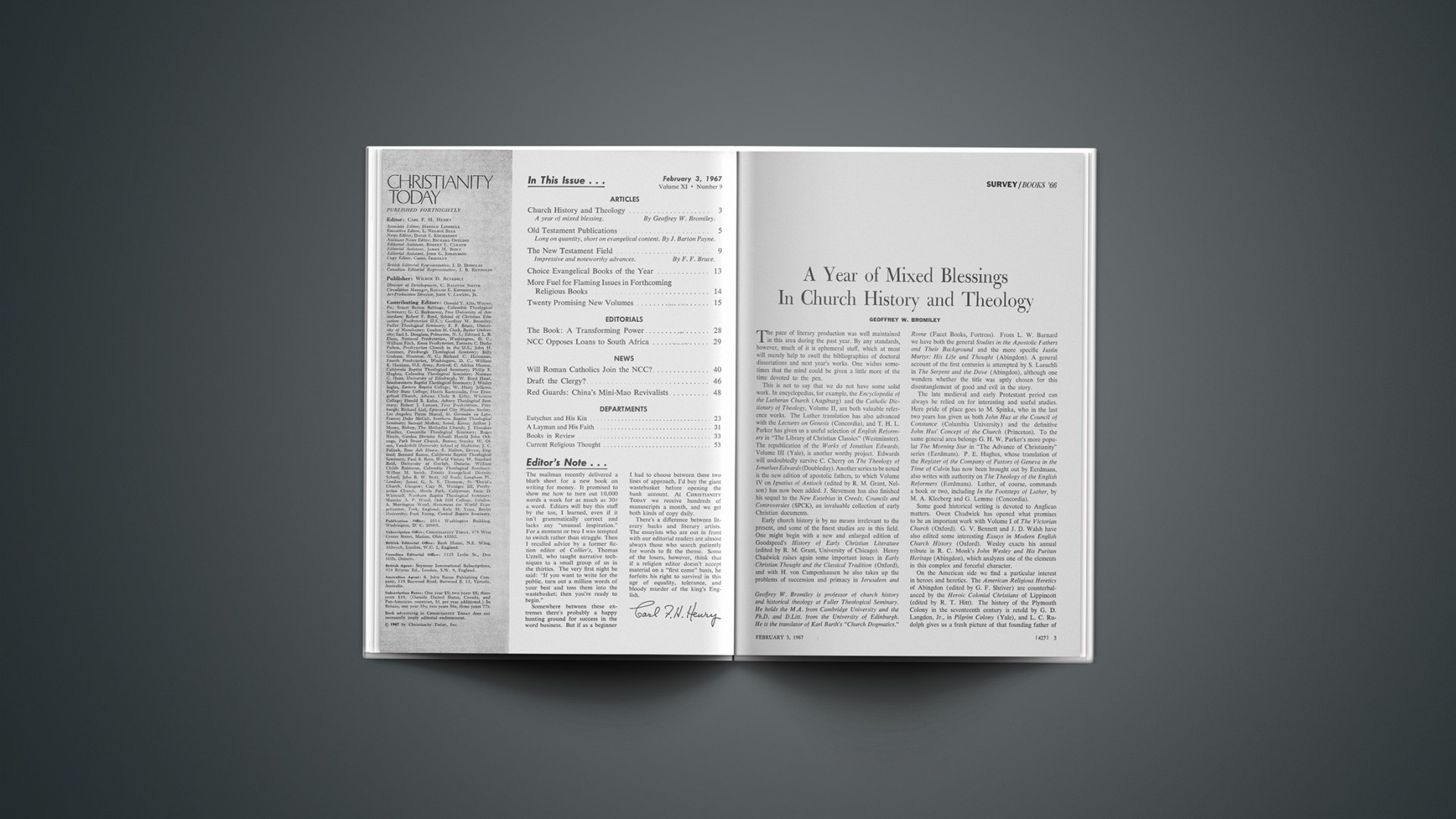The pace of literary production was well maintained in this area during the past year. By any standards, however, much of it is ephemeral stuff, which at most will merely help to swell the bibliographies of doctoral dissertations and next year’s works. One wishes sometimes that the mind could be given a little more of the time devoted to the pen.
This is not to say that we do not have some solid work. In encyclopedias, for example, the Encyclopedia of the Lutheran Church (Augsburg) and the Catholic Dictionary of Theology, Volume II, are both valuable reference works. The Luther translation has also advanced with the Lectures on Genesis (Concordia), and T. H. L. Parker has given us a useful selection of English Reformers in “The Library of Christian Classics” (Westminster). The republication of the Works of Jonathan Edwards, Volume III (Yale), is another worthy project. Edwards will undoubtedly survive C. Cherry on The Theology of Jonathan Edwards (Doubleday). Another series to be noted is the new edition of apostolic fathers, to which Volume IV on Ignatius of Antioch (edited by R. M. Grant, Nelson) has now been added. J. Stevenson has also finished his sequel to the New Eusebius in Creeds, Councils and Controversies (SPCK), an invaluable collection of early Christian documents.
Early church history is by no means irrelevant to the present, and some of the finest studies are in this field. One might begin with a new and enlarged edition of Goodspeed’s History of Early Christian Literature (edited by R. M. Grant, University of Chicago). Henry Chadwick raises again some important issues in Early Christian Thought and the Classical Tradition (Oxford), and with H. von Campenhausen he also takes up the problems of succession and primacy in Jerusalem and Rome (Facet Books, Fortress). From L. W. Barnard we have both the general Studies in the Apostolic Fathers and Their Background and the more specific Justin Martyr: His Life and Thought (Abingdon). A general account of the first centuries is attempted by S. Laeuchli in The Serpent and the Dove (Abingdon), although one wonders whether the title was aptly chosen for this disentanglement of good and evil in the story.
The late medieval and early Protestant period can always be relied on for interesting and useful studies. Here pride of place goes to M. Spinka, who in the last two years has given us both John Hus at the Council of Constance (Columbia University) and the definitive John Hus’ Concept of the Church (Princeton). To the same general area belongs G. H. W. Parker’s more popular The Morning Star in “The Advance of Christianity” series (Eerdmans). P. E. Hughes, whose translation of the Register of the Company of Pastors of Geneva in the Time of Calvin has now been brought out by Eerdmans, also writes with authority on The Theology of the English Reformers (Eerdmans). Luther, of course, commands a book or two, including In the Footsteps of Luther, by M. A. Kleeberg and G. Lemme (Concordia).
Some good historical writing is devoted to Anglican matters. Owen Chadwick has opened what promises to be an important work with Volume I of The Victorian Church (Oxford). G. V. Bennett and J. D. Walsh have also edited some interesting Essays in Modern English Church History (Oxford). Wesley exacts his annual tribute in R. C. Monk’s John Wesley and His Puritan Heritage (Abingdon), which analyzes one of the elements in this complex and forceful character.
On the American side we find a particular interest in heroes and heretics. The American Religious Heretics of Abingdon (edited by G. F. Shriver) are counterbalanced by the Heroic Colonial Christians of Lippincott (edited by R. T. Hitt). The history of the Plymouth Colony in the seventeenth century is retold by G. D. Langdon, Jr., in Pilgrim Colony (Yale), and L. C. Rudolph gives us a fresh picture of that founding father of American Methodism, Francis Asbury (Abingdon). Too much should not be expected of so short a work as The Religious History of America, by E. S. Gaustadt (Harper & Row), although it will be appreciated by those who share its emphases. More generally satisfying is D. E. Trueblood’s The People Called Quakers (Harper & Row).
The year has produced some good studies, including a whole series on church growth by Eerdmans. More generally, S. Neill makes an acute analysis of the significant if ambiguous relation between Colonialism and Christian Missions (McGraw-Hill), while J. Edwin Orr’s The Light of the Nations (Eerdmans) might very well be regarded as a history of mission by revival. We also have a voice from Scandinavia, that of A. Sundkler on The World of Mission (Eerdmans). Three biographies may be put under the heading of world evangelism. Lois Carlson tells again the story of her husband in Monganga Paul (Harper & Row). R. K. Curtis takes up again a familiar theme in They Called Him Mr. Moody (Eerdmans). Finally, J. Pollock writes an official biography of the world’s leading evangelist today, Billy Graham (McGraw-Hill).
It may be doubted whether any of the new devotional works listed can compare with the great classic, William Law’s Serious Call (reprinted by Eerdmans). Selected Sermons of St. Augustine, edited by Q. Howe (Holt, Rinehart and Winston), should also promote spiritual nurture as well as patristic knowledge. The riches of hymnology are explored by E. Routley in Hymns and Human Life (Eerdmans). Those who seek a better understanding of worship may profitably consult F. W. Schroeder’s Worship in the Reformed Tradition (United Church Press) and also The Liturgy of the Church of England Before and After the Reformation, by S. A. Hurlbut (Eerdmans).
Some of the most interesting books come from leading Roman Catholic authors, especially on the reforming side. The ecumenical bearing of the recent council is discussed by B. Leeming in The Vatican Council and Christian Unity (Harper & Row). Hans Küng tackles a question of peculiar difficulty to Roman Catholics in Freedom Today (Sheed and Ward). From Karl Rahner we have Volume V of his interesting Theological Investigations. Behind the enlightened chorus, however, a more sinister note is sounded by Pope Paul in his encyclical Christi matri rosarii, whose mariology is less commendable than its plea for peace. Here is a salutary reminder that for all the changes, Roman Catholicism still has an active element that is incompatible with evangelical truth.
Ethics has gone increasingly theological. This is good, but it is no panacea. Everything depends on the theology. G. F. Woods gives us a Defence of Theological Ethics (Cambridge) that raises the question whether, if defense be needed, it should not itself be a theological defense. J. Sellers has a Theological Ethics (Macmillan) that does at least illustrate the need for a sound theology if we are to have a sound ethics. In a class of its own is the monumental Theological Ethics of H. Thielicke (Volume I: Foundations, Fortress), which from a Lutheran standpoint gets to grips with the real dogmatic issues behind ethics and is one of the great books of the century. It demands serious scrutiny and shows up only too vividly the shallowness of so much that passes for ethical discussion in our day.
From theological ethics it is but a step to theology in the narrow sense. In How I Changed My Mind, essays by Barth have been collected and published with some interesting photographs and chatty introductory material by J. D. Godsey (John Knox). H. A. Meynell in Grace Versus Nature attempts an evaluation of one of Barth’s main emphases from a Roman Catholic standpoint (Sheed and Ward). I Knew Dietrich Bonhoeffer, edited by W.-D. Zimmerman (Collins), presents Bonhoeffer through the eyes of some of those who knew him. Existentialism finds a persuasive advocate in J. Macquarrie’s Principles of Christian Theology (Scribners) and Studies in Christian Existentialism (Westminster), but the future of real theology is obviously not to be found here. Georgia Harkness has a good theme in The Fellowship of the Holy Spirit (Abingdon), but there is more solid meat in the reprint of Swete’s The Holy Spirit in the Ancient Church (Baker). W. Hordern writes the Introduction (Volume I) to the series “New Directions in Theology Today” (Westminster); it is more helpful descriptively than materially. A. H. Leitch uses the similar but more biblical Winds of Doctrine (Revell) for a survey from a more orthodox standpoint. C. F. H. Henry also has a fine review of the modern theological scene in Frontiers in Modern Theology (Moody). Another useful survey is the Guide to the Modern Debate about God, by D. E. Jenkins (Westminster), which rightly perceives that the knowledge and doctrine of God are basic to all else.
This leads us to the great theological fad of the year, the so-called death-of-god theology—a nice contradiction in terms! It is ironical that God’s supposed death has been needed to focus attention again on the living God as the proper theme of theology. Also ironical is the way in which most of the titles, even in refutation, ring the changes on the death-of-God theme. Is advertising our theological criterion? T. J. J. Altizer himself is, of course, justified when he tries to state what he has in view under the titles The Gospel of Christian Atheism (Westminster) and (with W. Hamilton) Radical Theology and the Death of God (Bobbs-Merrill). The only problem is to find the Gospel and the theology. But then a Roman Catholic response comes under the query Is God Dead? (edited by J. Metz; Paulist Press). The same (rhetorical) question is asked in the title of a Zondervan symposium. K. M. Hamilton has the bold title God Is Dead (Eerdmans), though in fact he writes one of the best rejoinders. J. W. Montgomery has another refutation under the more general The Is God Dead Controversy (Zondervan), and under the similar The Death of God Controversy (Abingdon) T. W. Ogletree attempts a rather different evaluation. G. H. Girod assures us in his title that God Is Not Dead (Baker), and G. MacGregor, though on substantially liberal ground, feels bold to speak of God Beyond Doubt (Lippincott). It is surely odd that in none of the titles is clear reference made to the great biblical doctrine of the living God.
Is it right, in any case, that theology should dance thus to the piping of atheism, however Christian? One might argue with some justice that the truth must be stated in opposition to every form of error. One might also point out that stupid ideas about the value of death-of-God teaching need to be averted and exploded by proper analysis and refutation. It should be remembered, however, that even the negative task will not be done unless the movement is not taken too seriously as theology but is rather unmasked as the empty, speculative mythologizing it really is. Nor can the positive task be fulfilled unless it is clearly seen and shown that, first and last, to know God is to know him as he has revealed himself to be in Holy Scripture. The death-of-God theology is another attempt to fill the vacuum left by the failure of so much modern theology faithfully and forcefully to present the biblical God, who is not only the God of the living but also the living God.










